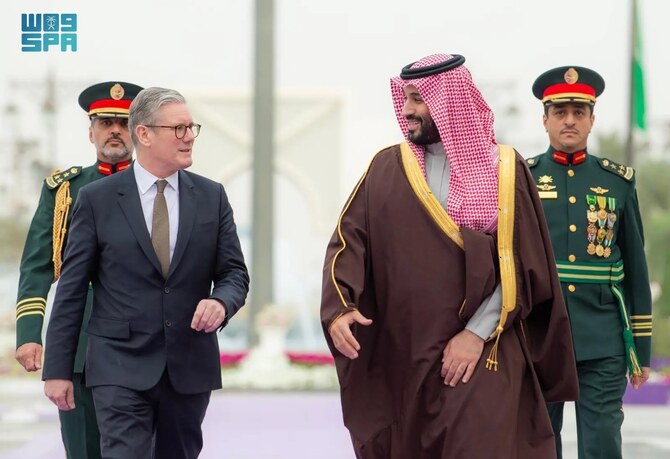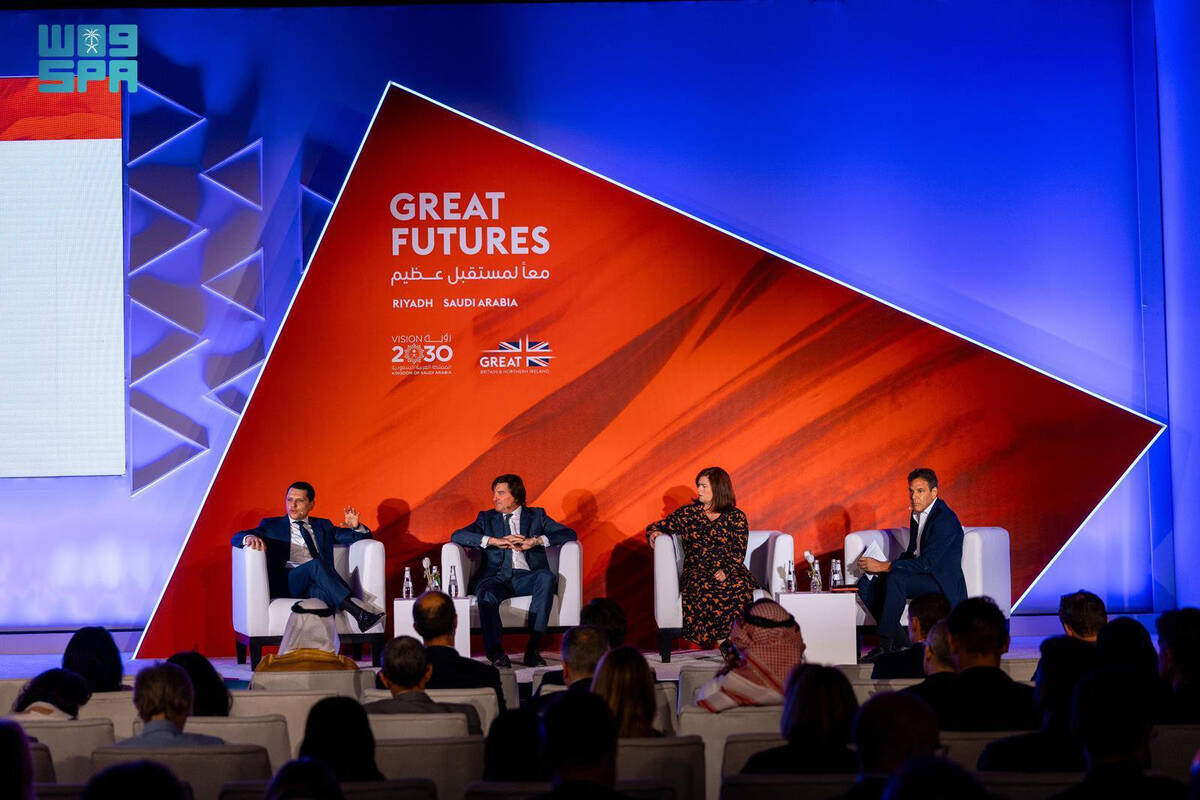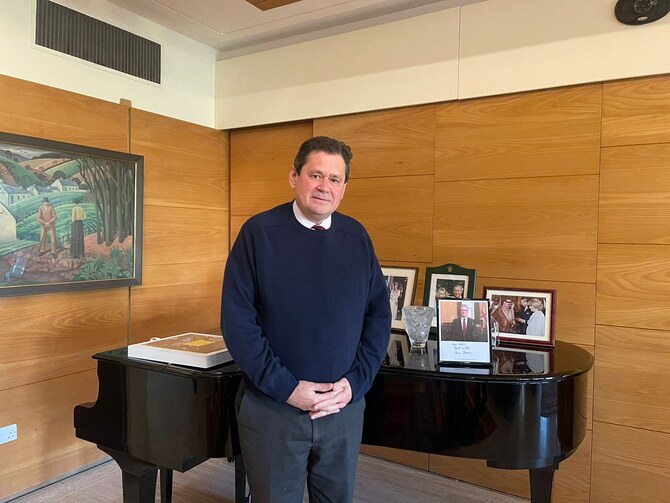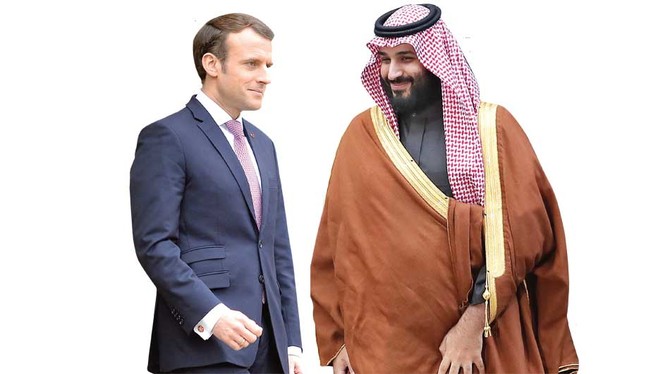PARIS: It is entirely feasible that Mohammed bin Salman and Emmanuel Macron can be friends. They have much in common.
Both are young men. The crown prince of Saudi Arabia is just 32, while Macron was 39 when he became his country’s youngest-ever president, and turned 40 only recently, in December.
On the earlier legs of his global tour, which has taken him to Britain, the US and Egypt, the prince’s dealings have all been with leaders who are old enough to be his parents. US President Donald Trump is 71, British Prime Minister Theresa May is 61 and Egyptian President Abdel Fattah El-Sisi is 63. Macron is of the prince’s generation.
Both are ambitious and both are in a hurry. The crown prince certainly makes no secret of it, telling Time magazine in a recent interview: “I don’t want to waste my time. I am young. ”
Vision 2030, Saudi Arabia’s wide-ranging plan for reforming its economy and society, is the prince’s brainchild, and though the name implies the notional target for the changes is 2030, it often seems that the prince does not want to wait that long.
Macron was so impatient for change in France — and so ambitious to be the one to implement it — that he announced his candidacy for president without bothering to court endorsement from any political party. Once a member of the Socialist party, he neither returned to that fold nor sought a place in another. Instead, he formed his own movement in April 2016, named it “En Marche!” (suitably dynamic, it translates loosely as “Let’s go!”) and got on with the task of winning over the country. Thirteen months later, he was elected president with 66 percent of the vote.
Mohammed bin Salman also acceded to his position as heir to his father, King Salman, through a vote. As he explained to Time magazine, he could not have become crown prince without the endorsement of the Allegiance Council, the body responsible for determining future succession to the throne of Saudi Arabia.
The council is made up of sons and grandsons of King Abdul Aziz, founder and first monarch of Saudi Arabia. Currently, there are 34 members.
“So I get the highest vote in the history of Saudi Arabia, more than anyone before me,” the prince told Time. “I got 31 from 34 votes of the Allegiance Council. So this is the highest.”
The next highest vote ever recorded was 22, he added.
Neither leader appears to have a great fear of upsetting sections of their domestic audience in the pursuit of radical reforms. In France, that is a guaranteed consequence of taking on the unions and challenging public-sector workers over their working hours or retirement age. French transport workers have been on strike for a week now.
But Macron is committed to reforming French labor laws, ridding the country of its reputation for inflexibility and old-style bosses-versus-unions confrontation and making France more business-friendly. 
Similarly, the crown prince is well aware that not everyone in Saudi Arabia approves of his reforms. But he also knows that his contemporaries, the young, who make up two-thirds of the population, are mostly with him.
So there should be much on which to build a strong rapport when Mohammed bin Salman arrives in Paris on Sunday night for a two-day visit.
The visit will concentrate on culture, tourism, investment and new technology. The prince is due to visit the French capital’s start-up hub, Station F. However, there has been no hint about new contracts to be signed.
Instead, Macron’s officers have spoken of a “new cooperation” with Saudi Arabia.
“We want a new cooperation, concentrating less on contracts and more on investing in the future, especially in digital and renewable energy, with a common vision,” is the word from the Elysée Palace.
The word “vision” is certainly one the crown prince understands well.
“I suspect the objective for the trip to France is pretty much the same as the visit to the US and the UK — to present Mohammed bin Salman as the future leader of Saudi Arabia and to highlight investment opportunities in an evolving economic and social environment there,” said Jerry Feierstein, director of Gulf affairs and government relations at the Middle East Institute.
“The Saudis have already announced a major deal with a French entertainment company to build movie theaters in the Kingdom. They may be interested in more French investment in the entertainment or tourism sectors.
“There may also be interest on both sides in discussing Saudi plans to develop their nuclear energy sector where the French have major capacity. Finally, there may be some discussion on defense purchases.”
As for Saudi Arabia, a source close to the royal delegation told AFP: “This is not a traditional state visit. It is about forging a new partnership with France, not just shopping for deals.”
Some observers view the visit as an expression of confidence by the prince.
AFP reports that more than a dozen memorandums of understanding are set to be signed between French and Saudi organizations in the fields of tourism, energy and transport. There is also scope for stronger cooperation on combating terrorism.
Experts say Macron also has to balance strengthening ties with Saudi Arabia with managing relations with other countries in the region, especially Iran. The prince’s sojourn in the US appears to have brought Riyadh and Washington closer together. President Donald Trump’s dislike of the Iran nuclear deal is well known.
Denis Bouchard of the French Institute of International Relations said Macron has to persuade Mohammed bin Salman that “it is better than have the 2015 nuclear agreement with Iran than no deal at all.”
The prince and the president have met once before, when Macron stopped off briefly at Riyadh airport en route to Abu Dhabi to weigh into the crisis sparked by the prime minister of Lebanon, Saad Hariri, announcing his resignation live on television from Saudi Arabia.
But Jerry Feierstein warned that for all the similarities between them it would be wrong to assume the crown prince and Macron will automatically become best friends. There are other contenders for that role, he said.
“Certainly Macron and Mohammed bin Salman would have more in common than with Trump, who is old enough to be the prince’s grandfather. But the crown prince does seem to have a close relationship with (Trump’s son-in-law) Jared Kushner, who is also closer in age.”
Unafraid of reform: The kindred spirits of Saudi crown prince and Macron
Unafraid of reform: The kindred spirits of Saudi crown prince and Macron

- More than a dozen memorandums of understanding are set to be signed between French and Saudi organizations.
- Saudis announced a major deal with a French entertainment company.
Saudi Arabia renews call for international community to stand by Syria

DUBAI: The Saudi foreign ministry condemned the Israeli attacks on Syrian territory in a statement on X.
The ministry expressed its satisfaction with the measures taken by the Syrian government to achieve security and stability over all Syrian territory.
Saudi Arabia called for the international community to stand by Syria and confront these ongoing Israeli attacks and violations against Syria.
Saudi Foreign Minister Prince Faisal bin Farhan discussed Israeli attacks on Syria with his Turkish counterpart Hakan Fidan on Wednesday.
The two ministers held the call after Israel launched powerful airstrikes in Damascus on Wednesday, blowing up part of the defense ministry and hitting near the presidential palace.
The attacks marked a significant Israeli escalation against President Ahmed Al-Sharaa’s government and came despite his warming ties with the US and his administration’s evolving security contacts with Israel.
Scores of people have been killed this week in violence in and around the predominantly Druze city of Sweida, pitting fighters from the Druze minority against government security forces and members of Bedouin tribes.
Jordan, Saudi Arabia to boost archiving, documentation cooperation

- Pact to strengthen cultural ties, preserve historical records via exchange of expertise and technology
AMMAN: Jordan’s government has approved a memorandum of understanding with Saudi Arabia to enhance cooperation in archiving and documentation, the Petra news agency reported on Wednesday.
The decision ratified an agreement between Jordan’s Royal Hashemite Documentation Center and Saudi Arabia’s National Center for Archives and Records.
The agreement will set out a framework to preserve and catalog historical documents, and the exchange of expertise and technology.
There will be joint training programs in document restoration, digitization, and professional development, Petra reported.
The plan includes archival exhibitions, scientific seminars, and joint research projects.
The agreement stipulates that shared documents and data may not be distributed to third parties without prior written consent, even after the pact ends.
It will be in effect for an initial three years and automatically renewed unless one side opts out in writing at least six months before the expiration date.
Riyadh deputy governor receives Mexico’s ambassador

Prince Mohammed bin Abdulrahman bin Abdulaziz, the deputy governor of Riyadh, received Anibal Gomez Toledo, Mexico’s ambassador to the Kingdom, in Riyadh on Wednesday, the Saudi Press Agency reported.
The ambassador visited to say farewell on completion of his tenure in the Kingdom.
Prince Mohammed praised the ambassador’s efforts in strengthening and advancing relations between the two countries and wished him success.
Great Expectations to Great Futures: British envoy Neil Crompton reflects on time in Riyadh

- Neil Crompton discusses Saudi Arabia’s transformation in a farewell conversation on the five-plus years he spent as His Majesty’s Ambassador to the Kingdom
- During his tenure, three British prime ministers visited the Kingdom — Boris Johnson, Rishi Sunak and, most recently, Keir Starmer
RIYADH: Among the many foreign diplomats I have seen come and go in Riyadh, few stand out quite like Neil Crompton, who is leaving the Kingdom after having completed a little over five years as His Britannic Majesty’s Ambassador to Saudi Arabia.
Crompton is, in many ways, the quintessential British diplomat. That self-deprecating wit and sharp sense of humor are trademarks of Crompton’s personality, which he tends to reveal only after loosening his proverbial necktie.
Like many Britons I met during my near-decade in the UK, and describe in “Anecdotes of an Arab Anglophile” (an anthropological book I published last year about my observations of London), Crompton was hard to crack at first — reserved and diplomatic, as one would expect.
But once the ice melted, I discovered a man of deep intellect, insight and genuine passion for the region.
Crompton began his journey with the UK Foreign Office in 1995, ascending through key posts before heading the Middle East desk in 2015. His appointment as ambassador to the Kingdom came in early 2020 — a pivotal time, not just for Saudi Arabia, but for the world.

Almost immediately after landing in Riyadh, Crompton — like the rest of the world — found himself in the midst of the COVID-19 pandemic.
“I have a very vivid memory of how professional and reassuring the Saudi government response was,” he told me. “The communication was very clear. You’ve got a good public health system.”
He added: “There was a very important decision by the government that everybody in the Kingdom would be treated the same regardless of nationality, which is very important. So we felt very reassured by that.”
When the dust of COVID finally settled, Crompton began to see the transformation Vision 2030 promised, not just on paper but in reality.
“I remember going to Riyadh Boulevard for the first time. And there was a polar bear dancing on the wall to the sound of, ‘I Like to Move, Move It,’” he laughed. “It’s just a nice atmosphere, families, grandpas, grandchildren, people out and about.”

But of course, the transformation of Saudi Arabia is not limited to opening up and allowing once forbidden forms of entertainment. “When I met lots of ministers, went to ministries, you could feel the change,” he said. “You went into ministries and you saw everyone working hard.
“People talked about KPIs. I don’t remember hearing the term KPIs 10 years ago. Maybe I was wrong, but everyone was very focused, friendly, and wanted to both advance the Saudi national agenda but work out how they could collaborate with us.
“So it was sort of a mix of social change and then sort of changing corporate ethos. Britons asked me about Vision 2030. I say Vision 2030 was a vision, but now it’s a plan, and it’s been executed and very successfully.”
During Crompton’s tenure, three British prime ministers visited the Kingdom — Boris Johnson, Rishi Sunak and, most recently, Keir Starmer.

As ambassador, Crompton had numerous interactions with Saudi Arabia’s Crown Prince Mohammed bin Salman. But the relationship goes back further. “The first time I met the crown prince was back in 2015,” Crompton said.
“He’s very dynamic, he’s on top of his brief. He’s always very positive about the relationship with the UK. I think he sort of talks about it as being a strategic partner, but also says, ‘you’ve been a historically reliable friend.’
“And so I think everyone always comes away fired up because he has so much energy and enthusiasm for what he’s talking about.”
The shared monarchical systems of both nations, according to Crompton, provide a foundation of mutual understanding and respect.
“I think there’s a sort of natural affinity between monarchies. We’re probably the minority in the world, but I think the royal families tend to know each other. And I think there’s a sort of familiarity.

“When Her Majesty the Queen passed, I was very touched by the messages I got from Saudis all over the Kingdom, just saying how sorry they were to see her pass.
“And connections between individual members of the royal families still go on. I know there’s constant messaging backwards and forwards, and that’s very positive.
“His Majesty King Charles, he’s a real expert on Saudi Arabia. I think he’s made six official visits. I just met him on a couple of occasions. But each time he’d talk about things he did in the past. You remember he gave a famous speech on Islam and the West. So he’s always very interested in interfaith dialogue.
“When Sheikh Mohammed Al-Issa (secretary general of the Makkah-based Muslim World League) visited London, he saw him and he talked about the work that Saudi Arabia was doing in those areas.
“But also, in the few minutes I had with him, he asked: ‘Tell me what’s going on at AlUla, tell me what’s going on at this.’ So I think there’s a sort of familiarity, and I hope to nurture that.”

But while royalty might be well-versed in the Kingdom’s transformation, are ordinary Britons keeping pace?
“I think it takes a long time to change perceptions. There’s always a time lag,” Crompton said by way of admission.
“Initially, the sort of scale of ambition when we talked about Vision 2030, people said, ‘really, can you do all that?’ And some people said, well, even if they do 70 percent of that, it would be impressive.
“And actually, my experience … probably 90 percent (can) be done. Saudi GDP has grown by over 70 percent since 2016. New sectors coming along.”
If there was one group that quickly closed that gap, however, it was the British business community.
“One of the highlights of my time here was the GREAT Futures trade event we did last year with the Saudi Ministry of Commerce,” said Crompton. “And for that, 450 British companies came.
“But 60 percent came for the first time, a lot from the creative industries and educational sectors who hadn’t been before. And I think they all came away and said, wow. And they met Saudis and established good contacts, and a lot of business and new relationships have flowed from that.”

And the numbers speak volumes. “Bilateral trade has gone up 70 percent since COVID,” Crompton told me. “Last year, I believe it was $17 billion each way. And we have a commitment … to try and get bilateral trade to $30 billion by 2030.
“$30 billion is a magic number. Which I personally think we’ll exceed. And I think investment flows each way have increased significantly. And I think in the last five years, we’ve invested $23 billion in the UK. There’s lots of Saudi private investment.”
One of Crompton’s proudest efforts has been pushing forward the UK-GCC free trade agreement.
“I think we’re very close,” he said. “The negotiations started under the Conservative government, and actually we got quite close, and then we had an election, which just slowed things a little bit.
“Free trade is important to the health of the world economy. I think it’s a political signal between the Gulf countries and the UK, a political commitment to growing the relationship.
“This would be one of our first free trade agreements with a developing group of economies. And in the GCC’s case it would be the first time you signed a free trade agreement with a G7 country. So I think that would be very important.
“But more importantly, it will reduce tariffs in a number of areas, reduce some of the barriers, or some of the regulatory or bureaucratic obstacles to growing the relationship, and it provides a platform for growing trade.”

He added: “I think it’s 90 percent done. Both sides agree that there’s a set of issues now that can only be resolved by ministers, because they involve political decisions and if you like, a natural bargain.”
Though the GREAT Futures Initiative Conference took place under a Conservative government, Crompton is confident the strong Saudi-UK relationship will continue under Labour.
“They wanted to convey the message that the UK saw the Gulf as natural friends and important economic partners, and they wanted to maintain that relationship,” he said of the Labour government.
On the tourism front, Crompton highlighted the success of Saudi Arabia’s introduction of online visas — and he is glad that the UK managed to reciprocate shortly after.
“The scheme went live in June 2022. Initially, you could only get a single entry visa, but now you can get a two-year visa. And our figures say close to 750,000 Saudis have applied for and used that scheme … I think we’re the only Western country that offers an online visa service.”

He added: “And more Britons than ever are coming here. (For) the pilgrimage, but (also) for business or for events. I think we’re the second highest number of visitors after the Chinese. There are many more Chinese people than Britons.
“It’s important to have a good government-to-government relationship with the people-to-people links that make friends.”
It is not just tourists heading to Saudi Arabia. Investments — and soft power — are also flowing in both directions.
“There are important Saudi investments in northeast England,” Crompton said, with the flagship being the Public Investment Fund’s acquisition of Newcastle United.
“I have friends in the northeast who say the first thing they did was professionalize the women’s football team in Newcastle.”

He added: “I think people in the northeast say, well, this is really good. We want to do more with Saudi Arabia.”
One moment that truly embodied Saudi soft power for him? When the Saudi National Orchestra and Choir performed at the Royal Albert Hall in October 2024.
“I never forget they did Adele’s ‘Rolling in the Deep.’” he said. “They started (with) the men singing the Saudi traditional Saudi song. And then I remember when the lady came in and started singing, there were hairs standing up on the back of your neck. It was really impressive.”

The interview also touched on Saudi-UK defense cooperation, ongoing discussions about potential Saudi involvement in the Typhoon jet program, and the Kingdom’s emerging role in international mediation efforts.
Clips from these parts of the conversation are available on Arab News online.
As a parting gesture, I presented Crompton with a custom-made trophy resembling the front page of Arab News from 50 years ago — a small tribute to his time in the Kingdom.

True to form, he responded with classic British humor, presenting me with two ketchup sachets — a reference to a story from “Anecdotes of an Arab Anglophile” where I complained to the CEO of a major American fast food chain about not getting enough ketchup, which ultimately led to a change in company policy in the UK.
In the book, I lamented — only somewhat jokingly — how I never received any recognition from the British government for my efforts to improve UK customer service. I should be careful what I wish for, as Crompton clearly saw fit to remedy that.
I had to laugh. As Neil Crompton leaves the Kingdom, he does so with several feathers in his cap — but perhaps most importantly — with genuine affection for a country that is changing faster than most could have imagined.

Jazan’s Black Mountain rises to new tourism heights

- Named for its dark, volcanic rock formations, the mountain offers more than just dramatic colors. It is a place of raw natural beauty and ecological significance
RIYADH: Black Mountain, located in Al-Raith governorate of the Jazan region, is one of Saudi Arabia’s most striking natural landmarks, according to a Saudi Press Agency report.
Named for its dark, volcanic rock formations, the mountain offers more than just dramatic colors. It is a place of raw natural beauty and ecological significance.
Rising more than 2,000 meters above sea level, it ranks among the highest peaks in Jazan. Its rugged surroundings include sloping plains and winding valleys that attract hikers, nature photographers, and those seeking solitude in nature.
For much of the year, especially in winter and spring, the mountain’s peaks are cloaked in fog.
Its slopes are lined with native trees and traditional agricultural terraces that have supported generations of local farmers cultivating corn, millet, and coffee.
Several villages sit nearby, where locals maintain a deep connection with the land, the SPA reported.
Folklore passed down through generations speaks of the mountain as a refuge for shepherds and travelers in earlier times.
With the rise of ecotourism and outdoor exploration across the Kingdom, interest in Black Mountain has grown.
Young hikers, campers, and photography enthusiasts are increasingly drawn to its scenic terrain.
To support this, authorities are developing the site with walking trails, observation points, and informational signage that highlights local culture and biodiversity.





















